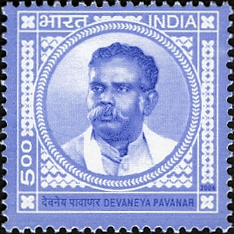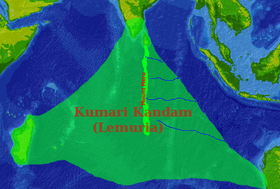Devaneya Pavanar facts for kids
Quick facts for kids
Devaneya Pavanar
|
|
|---|---|

Pavanar on a 2006 stamp of India
|
|
| Born | 7 February 1902 Gomathimuthupuram, Tamil Nadu |
| Died | 15 January 1981 (aged 78) Madurai, Tamil Nadu, India |
| Occupation | Author, Tamil Activist, Etymologist |
Devaneya Pavanar (born February 7, 1902 – died January 15, 1981) was an important Tamil scholar. He wrote more than 35 research books. He was also a strong supporter of the "Pure Tamil movement". This movement aimed to use only pure Tamil words, avoiding words from other languages. Pavanar also started a project to create an Etymological Dictionary. This dictionary would show the origins of Tamil words and how they connect to other ancient languages.
In his 1966 book, Primary Classical language of the World, Pavanar argued that Tamil is the "most natural" language. He believed it was also a "proto-world language," meaning it was the oldest language on Earth. From this ancient Tamil, he thought all other major languages developed. He also believed that ancient Tamil literature, known as Sangam literature, was much older than commonly thought. Mainstream experts in language, geology, and history do not agree with his theories.
Devaneya Pavanar also wrote many musical pieces and poems. The government of Tamil Nadu gave him the title Senthamiḻ Selvar in 1979. This means "Son of Pure Tamil." He was also called Dravida Mozhi nool Nayiru, which means "Sun of language."
His Life and Work
Gnanamuthu Devaneyan Pavanar was a Tamil professor. He taught at Municipal College in Salem from 1944 to 1956. Later, from 1956 to 1961, he led the Dravidian department at Annamalai University.
In 1959, he joined the Tamil Development and Research Council. This group was set up by the government to create Tamil textbooks for schools and colleges. From 1974, he directed the Tamil Etymological Project. He also served as the president of the International Tamil League in Tamil Nadu.
Today, the Chennai District Central Library is named after Devaneya Pavanar. It is located in Chennai.
His Ideas About Tamil
Pavanar had very strong beliefs about the Tamil language. In his book Vadamoli Varalaru, he argued that many Sanskrit words actually came from Tamil. He also believed that pure Tamil words existed for all Sanskrit words borrowed into Tamil.
He thought that Tamil was a "superior and more divine" language than Sanskrit. Pavanar believed that Tamil began in a lost land called "Lemuria" (Ilemūriyā). He saw Lemuria as the very first place where human civilization and language started. He felt that evidence of Tamil's ancient history was being hidden by those who favored Sanskrit.
Pavanar created a timeline for the history of humans and Tamil. Here are some of his ideas:
- Around 500,000 BC: Humans first appeared.
- Around 200,000 to 50,000 BC: The "Tamilian" or Homo Dravida evolved.
- Around 200,000 to 100,000 BC: Tamil language began.
- Around 100,000 to 50,000 BC: Tamil grew and developed.
- 50,000 BC: The Kumari Kandam civilization existed.
- 20,000 BC: A lost Tamil culture with advanced civilization existed on Easter Island.
- 16,000 BC: Lemuria was submerged under the sea.
- 6087 BC: The Second Tamil Sangam (an ancient Tamil academy) was started by a Pandya king.
- 3031 BC: A Chera prince brought sugarcane cultivation to Tamil Nadu from the Solomon Islands.
- 1780 BC: The Third Tamil Sangam was started by a Pandya king.
- 7th century BC: Tolkāppiyam, the oldest surviving Tamil grammar book, was written.
In his 1966 book, The Primary Classical Language of the World, Pavanar wrote about his views. He believed that Tamil had suffered much damage from nature and people. He also felt it had been treated unfairly by foreigners and even some people from India. He argued that Tamil was a highly developed classical language from Lemuria. He thought it had been suppressed by Sanskrit supporters.
Pavanar also compared Tamil and Sanskrit, explaining why he believed Tamil was "more divine."
| Tamil Language | Sanskrit Language |
|---|---|
| Primitive and original. | Derivative (came from something else). |
| Spoken and living language. | A literary language, not widely spoken. |
| Encouraged open study of religious texts. | Religious texts were studied by a select few. |
| Encouraged a global outlook. | Divided society into many groups based on birth. |
| Allowed everyone to become an ascetic (someone who lives a simple, religious life). | |
| Believed higher education should be for everyone. | |
| Encouraged giving gifts to all poor and needy people. | Encouraged giving gifts only to Sanskrit scholars. |
| Valued truth. | Valued trickery and copying others' work. |
| Emphasized love as a way to find lasting happiness. | Emphasized knowledge as a way to connect with the universal soul. |
| Had Saivism and Vaisnavism (religions with one main god). | Had a system of sacrifices to many smaller gods. |
Recognitions and Awards
Devaneya Pavanar received many awards and honors for his work:
- In 1955, the Tamil Peravai in Salem gave him a Silver plate. This was to thank him for his service to Tamil.
- In 1960, the Governor of Tamil Nadu gave him a Copper Plate. This was for his help in collecting administrative terms in Tamil.
- In 1970, the South Indian Saiva Sinddhanta Works Publishing Society gave him a Silver Plate. This was for his research in Tamil language history and word origins.
- In February 2002, official celebrations were held for Pavanar's 100th birthday. Events took place in Sankarankoil, Gomathimuthupuram, and Chennai. Important government officials attended these events.
- In February 2006, the Postal Department in Chennai released a special stamp honoring Devaneya Pavanar.
- In October 2007, the Government of Tamil Nadu built a memorial in Madurai to honor him.
The Government of Tamil Nadu has also "nationalized" Pavanar's literary works and books. This means the state now owns the copyright to his writings. His family received money for this.


